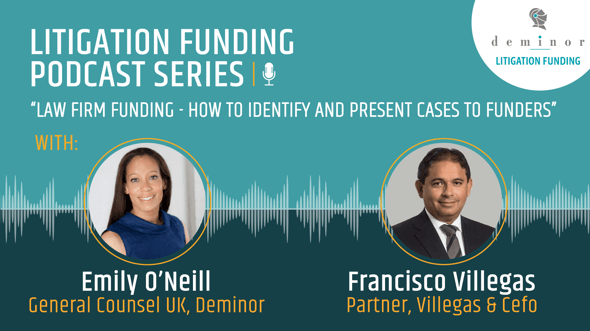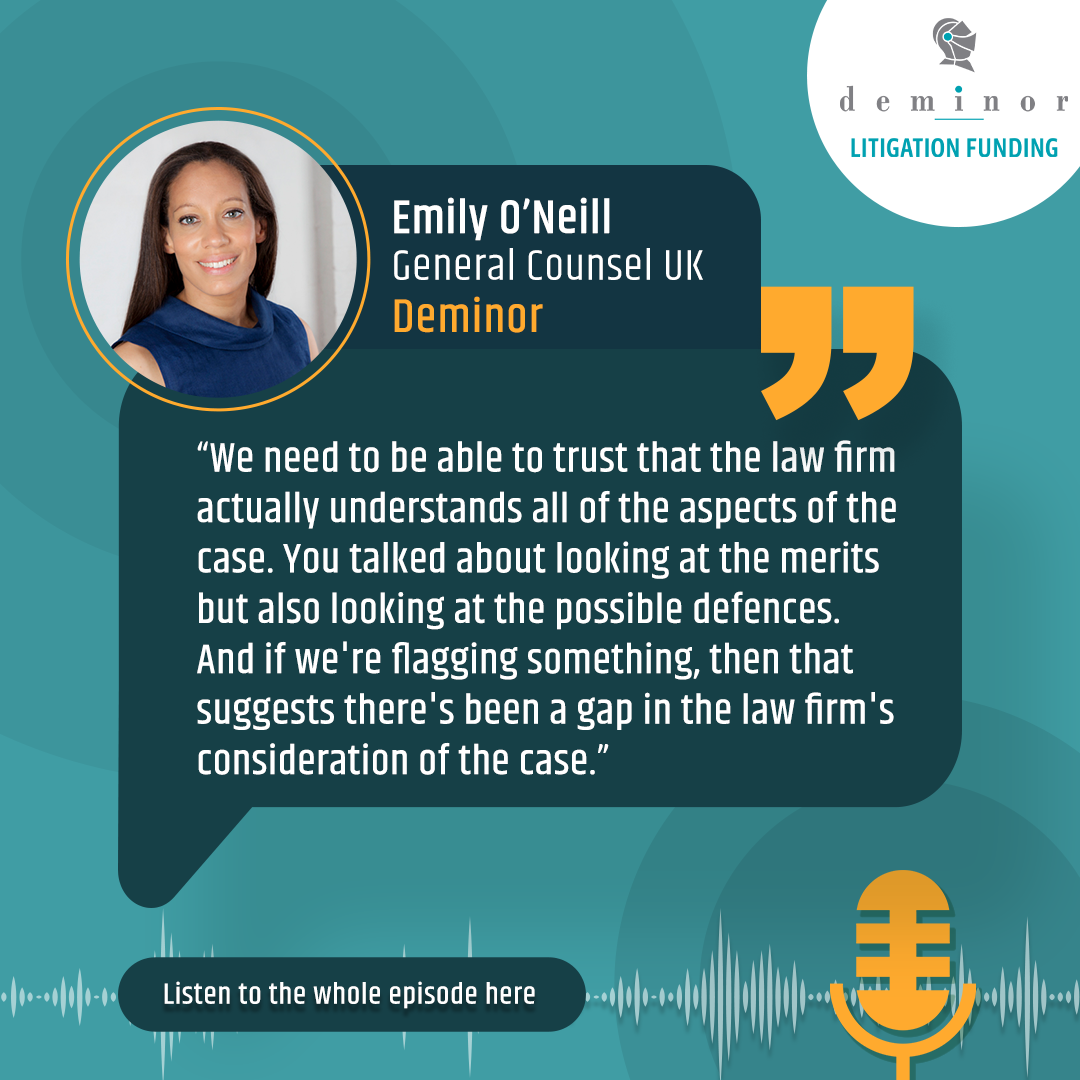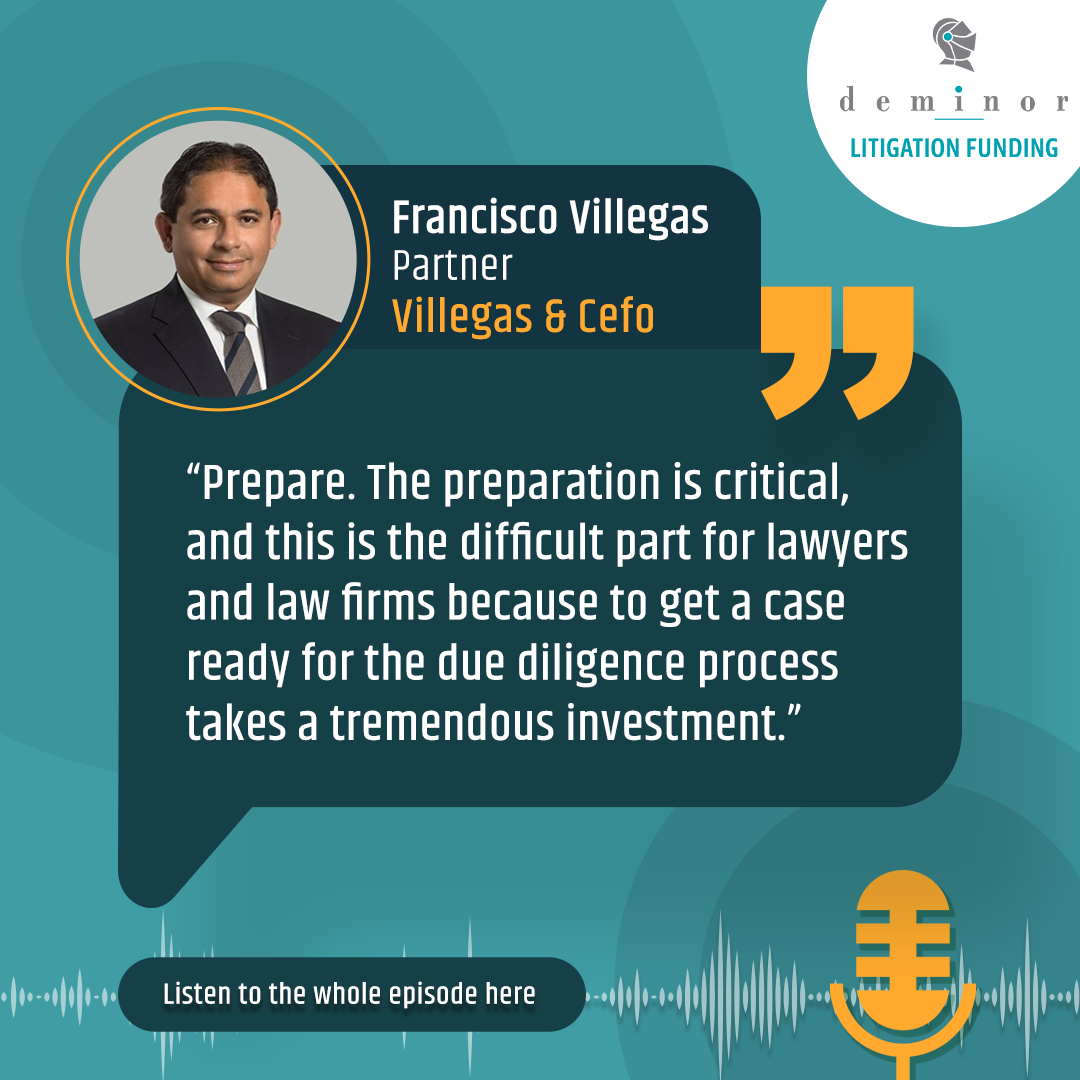In this podcast series, Emily O'Neill General Counsel UK for Deminor Litigation Funding, undertakes interviews with global professionals to discuss different aspects of litigation and litigation funding.
Deminor welcomes you to join this conversation as we summarise the key elements of the conversations between Emily O'Neill and these experts, as captured in the podcast transcripts below.
Podcast Preface:
Deminor General Counsel UK, Emily O'Neill (EON), speaks with Francisco Villegas, Partner at Villegas & Cefo, who provides IP litigation and counselling services for companies at all stages of development.
Podcast Transcript:
EON – Today I’m joined by Francisco Villegas of Villegas & Cefo in New York. We're going to talk about litigation funding. Francisco has a successful practice litigating funded cases. So we're going to take a look at funding from the law firm side around how to identify cases and bring those successfully to funders. So, first question, Francisco…
EON – What do you look for when selecting cases to take on, and later seek funding for?
FV – When I look at cases that are brought by clients, or if I'm out looking for cases as to develop new business, I think ‘is the case going to win?’ And to assess that, I look at a few things. I look at the merits. How strong are the merits? Clients always think that their cases have strong merits, but you have to look at them. Also, what are the defences? What is the other side going to raise as roadblocks to get to the inevitable third part - the damages. There's been a lot of cases that we've looked at where the merits were great; we did not think that there was a viable defence. But then when you dig down into: what can you actually extract from the litigation? What's the business rationale for this? Sometimes the damages fall flat and you have to have that. Especially in funded cases, where you have litigation between competitors, and it's primarily for an injunction, or for other competitive reasons, damages are really not that important. But with funded cases, you have an investor and you have the client, and both of them have to be aligned, and if you don't have those damages, the case isn't going to work.
And the fourth item, and the last item that we look at is the story. Is there a compelling story that we feel we could tell at trial and throughout the litigation about what makes this litigant and the claim special? Sometimes, there is no story. Sometimes, the story, in fact, is not so good. There could be warts on the case. There could be problems with prior corporate structure. There could be simply no story at all, because maybe the claim was somehow acquired by the entity. So, the story component is nearly just as important as the other items because we don't have the story. You may not win the judge over during the litigation, and you probably are not going to win the jury at trial.
EON – That approach aligns well with our own internal due diligence process. Obviously, merits and winning are important, but it is the economics or the commerciality of the case which is often a problem in some of the opportunities that are presented to us. And until you have a view to that, if there's not going to be enough in there for the funder to get their money back in return and the client to take home the lion's share, it's not a viable case for funding.
EON – All funders are different, but the general feedback in the market is that getting funding is time-consuming and difficult. How do you put your cases together to get a quick decision from funders?
FV – There is no way around doing hard work to get the case funded.
Lawyers are generally interested in litigation funding until they find out that to get a case funded requires a lot of work and commitment to the clients and also to the funding process. And what that means is that a sponsoring lawyer needs to know everything about the merits, everything about the defences, everything about the damages and everything about the story. You need to have done the legal research, you need to have done the factual due diligence, you need to have thought strategically about what the defence is going to do, the damages and the storyline, and you need to take all of that information and synthesise it in a way that a funder can review it easily and that it provides a compelling story.
Even if all those facts and case law line up and you have a phenomenal case, if you don't tell that story to the funder, you're going to get a no. Think of it from the funder's perspective: somebody starts emailing and sends some attachments, articles, and Excel sheets. The funder is looking at 50 or 100 cases, or some phenomenal amount of opportunities, and you want your opportunity to be easy to digest. That immediately signals to the funder that this is a great case; please give me your limited time and look at it. And the synthesis of the information is very important because, without that, even a great case will not get funded.
Also, important to your question, this is the only thing that the lawyer can control because the rest of the funding process, to a certain extent, is led by the funder. The funder has to look at the case; it sometimes has to go to outside counsel, and sometimes there are committees depending on how the funder is structured. All the lawyer can do is make sure that the information presented is presented well and proactively addresses questions that the funder will likely have, and that is what the lawyer should be focusing on. And then, hopefully, that gets you a result in as quick of a time as possible.
EON – That sounds ideal. If every case that I looked at was presented in that way, that would be fantastic and easy to digest. For me, setting out strengths plus weaknesses is also useful because I've gone through due diligence on quite a lot of cases where you dig down, and then something which would have been apparent from the beginning comes out as a weakness, and that results in a bit of a trust issue with the law firm.
FV – Credibility. If something comes out that even if it's just a marginal defence and it's the funder that points out the defence, you're going to start losing credibility. And I look at the funding process as: First, the merits have to be there. But there's also, as in any business transaction, a little bit of trust. The funder must feel that the information that's being provided is correct, and also it needs to be balanced. The funder is your investor to a certain extent, and the investor needs to feel that the information is solid, and the funder will not be able to dig down into the case as much as the law firm will. And if issues start coming up that were not presented and it's the funder pointing them out, I think the likelihood of funding will probably go significantly down.
EON – Absolutely. I think trust is key. I mean, this is a long-term project, so we're going to be involved in funding the case for multiple years and having trust in the law firm and the client is really important for us. I think the credibility point is also a good point. We need to be able to trust that the law firm actually understands all of the aspects of the case. You talked about looking at the merits but also looking at the possible defences. And if we're flagging something, then that suggests there's been a gap in the law firm's consideration of the case.
FV – Sometimes, lawyers who are new to funding don't understand that, in most instances, funders are hands-off, meaning once the case is funded, generally, funders do not dictate how the case is run. For that reason, it's critical that the law firm provides all the information upfront because if you put yourself in the funder's shoes, even if this information comes out at a later date, it's going to look very bad, and it's going to greatly erode the trust in what you pointed out, which is this long-term relationship of many, many years. And so, it's critical that all the information, good and bad, is disclosed upfront.
EON – Once the case is funded, how much interaction do you normally have with the funder, and how can you make that an efficient process during the course of the litigation?
FV – That depends. Some funders have been very hands-off. They fund the case in the beginning, and they ask for periodic status reports. Sometimes, I don't receive many, if any, responses from the status reports, and my interaction has been limited to simply asking for drawdowns.
That said, other funders take a more active approach. By active, I mean they want to engage in the status reports. They want to talk about the merits of the case. From my perspective, I prefer funders that are active. The reason I like that is I feel that funders first are detached from the litigation. And if I'm not convincing the funder, or if the funder raises issues that either I haven't focused on or perhaps have not addressed to their satisfaction, that gives me an opportunity to think about my own case.
I find the feedback from funders, both funders that have strong IP departments, which is what my practise is, and those that do not helpful. I find that all the questions I receive simply help strengthen how I look at my case and prepare me to defend the merits of my case, so I greatly appreciate their feedback. After all, they probably have a stable of cases they're looking at and anything they can contribute to the litigation I want to know about it.
EON – From a funding point of view, it's quite nice to have that high-level view over what's going on in the case and to ask a few questions. That also helps with continuing the trust because when the answers come back and they're well thought out, and we can really understand how the case is moving forward, that also helps strengthen the relationship.
EON – What are your three top tips for working with funders?
FV – Prepare. The preparation is critical, and this is the difficult part for lawyers and law firms because to get a case ready for the due diligence process takes a tremendous investment. This isn't 40 or 80 hours; the due diligence goes into the hundreds of hours. One of the benefits of that, however, is if you do get the case funded, all that due diligence has simply made your case ready to file and go to trial. You have already looked at the requirements for filing the case, the defences, and the damages; you've already developed the case that will eventually, hopefully, prevail. So, item one: Be prepared.
Item two is not to be discouraged. The likelihood of getting a case funded on the first call is probably low, but if you prepared your case, you should take the no’s from the funders as an opportunity to address shortcomings you didn't see. So if you prepared well and the funder finds something that makes the funder nervous, you should take it as an indication that you need to increase the amount of research, maybe find more facts, or perhaps present that argument differently. You should take those no's, improve your presentation, improve your data room where you keep your repository of documents, and in the next go around, have a stronger case that will hopefully be funded. And this is a very difficult thing to accept, right? Because when you get a no, you take it very personally. A lot of time has been invested. But if anything, you should use the no's in the process as an opportunity to further refine what it is that you're trying to ultimately achieve, which is to find financing for your client.
Then, number three, you should do some due diligence on the funders if you can. And what I mean by that is certain funders have certain tastes. Some funders like certain kinds of commercial matters, some funders hate intellectual property matters, and some funders like software matters. If you can, it's important to assess: What is this funder looking for? What is this funder's appetite to deploy capital? Because there's a lot of work that goes into not only the due diligence to get your case ready but also the presentation of those materials to the funder. And so, if you can target a few funders that you believe you have the highest chance of success, you should do that instead of sending 40 emails out and hoping for the best because you're going to get a lot of no's, you might waste a lot of time working with the funder, when in reality that funder at that particular point can't deploy capital. Maybe you're pitching the wrong kind of case to a funder that is generally known to support or reject certain cases. So it's important to know a little bit about your audience before you engage in this process. Only, given the amount of time spent on both sides, you'd be saving yourself time and saving that funder some time. And as you get more and more involved in litigation, you want funders to know that you're going to present things that they want to see. If you're presenting things that are just not in their wheelhouse in terms of subject matter, you'll begin to receive a reputation that you're willing to pitch anything out there, and perhaps you're not the one that they should take your phone call. So it's important to have all three items together to hopefully get the results you want for your client.
EON – Thanks, Francisco. They were great tips. I wholeheartedly agree. Don't be discouraged, because that goes into knowing the funder and what they like and don't like, and it doesn't mean the case is a bad case. It may just be the funder's risk appetite at that time.
I think the other thing to ask funders about is their capital adequacy. Do they have sufficient funds actually to fund the case? How are they structured? Where's the money? How is that going to be deployed? Will that be immediate, or will there be some sort of delay in that coming forward? Because that all goes to the timing of filing the suit and approving the funding. So I think hopefully those add a little bit from the funder side.
Hopefully, everybody has taken a lot out of today’s episode and can use these tips to prepare cases, meaning we'll see stronger cases for funding.
Litigation Funding Podcast Series - Next Steps and Further Information:
Thanks for joining Deminor's Litigation Funding Podcast Series as we dive deep into core topics in funding litigation.
Keep a lookout for our upcoming conversations as Deminor General Counsel UK, Emily O'Neill, speaks with several more experts to get their insights into different aspects of litigation funding.
If you would like to connect with either Emily or Francisco on LinkedIn, please click on the links below:
Emily O’Neill – Deminor General Counsel UK and Global IP lead
Francisco Villegas – Partner at Villegas & Cefo, LLP
***
Further Reading:
- https://www.deminor.com/en/case-studies/co-funder-proposes-sharing-of-litigation-funding-risk-to-leverage-deminors-in-house-due-diligence-capability
- https://www.deminor.com/en/case-studies/financing-assertion-of-patents-protecting-manufacturing-processes
- https://www.deminor.com/en/case-studies/telecoms-patent-assertion-multi-jurisdictional-campaigns
- https://www.deminor.com/en/case-studies/canadian-innovative-start-up-preparing-for-a-david-v-goliath-litigation-funding-battle
- https://www.deminor.com/en/case-studies/whats-the-risk-assessing-the-risk-of-counter-assertion-by-the-defendant-in-patent-litigation
- https://www.deminor.com/en/case-studies/overstepping-the-mark-litigation-funding-trade-mark-infringement
- https://www.deminor.com/en/case-studies/lights-camera-action-recovering-damages-for-infringement-of-rights-in-a-short-film
- https://www.deminor.com/en/case-studies/recovering-damages-for-stolen-software-through-litigation-funding
- https://www.deminor.com/en/case-studies/funding-in-the-pharma-sector-/-investing-in-a-case-where-litigation-is-already-ongoing









